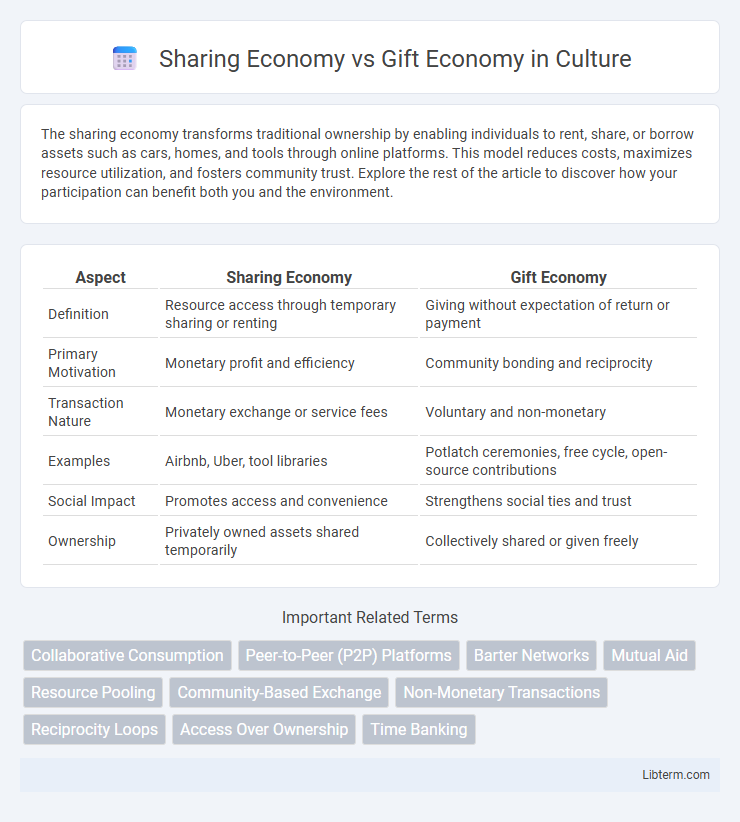The sharing economy transforms traditional ownership by enabling individuals to rent, share, or borrow assets such as cars, homes, and tools through online platforms. This model reduces costs, maximizes resource utilization, and fosters community trust. Explore the rest of the article to discover how your participation can benefit both you and the environment.
Table of Comparison
| Aspect | Sharing Economy | Gift Economy |
|---|---|---|
| Definition | Resource access through temporary sharing or renting | Giving without expectation of return or payment |
| Primary Motivation | Monetary profit and efficiency | Community bonding and reciprocity |
| Transaction Nature | Monetary exchange or service fees | Voluntary and non-monetary |
| Examples | Airbnb, Uber, tool libraries | Potlatch ceremonies, free cycle, open-source contributions |
| Social Impact | Promotes access and convenience | Strengthens social ties and trust |
| Ownership | Privately owned assets shared temporarily | Collectively shared or given freely |
Introduction to Sharing Economy and Gift Economy
The sharing economy involves peer-to-peer-based sharing of access to goods and services, often facilitated by digital platforms like Airbnb and Uber, emphasizing efficient resource utilization and monetization. The gift economy operates on voluntary giving without explicit agreements for immediate or future rewards, fostering community bonds and trust through acts of generosity. Both models challenge traditional ownership notions but differ in motives, with the sharing economy driven by economic incentives and the gift economy rooted in altruism.
Core Principles: Sharing vs Gifting
The sharing economy revolves around temporary access and collaborative consumption, emphasizing resource efficiency and mutual benefit through shared use. In contrast, the gift economy prioritizes unconditional giving without expectations of direct reciprocation, fostering social bonds and community trust. Core principles distinguish sharing as transactional and use-based, while gifting centers on altruism and relational exchange.
Historical Roots of Each Economic Model
The sharing economy traces its roots to early cooperative movements and communal resource management practices dating back to the 19th century, emphasizing access over ownership through digital platforms like Airbnb and Uber. The gift economy, with origins in ancient tribal societies and indigenous cultures, relies on reciprocal giving and social bonds rather than market transactions, exemplified by potlatch ceremonies and kula ring exchanges. Both models reflect distinct historical approaches to resource distribution, with sharing economies evolving alongside capitalist frameworks and gift economies rooted in social cohesion and mutual obligation.
Key Players and Platforms
Key players in the sharing economy include platforms like Airbnb, Uber, and Lyft, which facilitate peer-to-peer access to assets such as homes and vehicles for monetary exchange. In contrast, the gift economy is driven by communities and platforms like Freecycle and Couchsurfing, emphasizing voluntary sharing of goods and services without financial compensation. Both models leverage technology to foster trust and collaboration, but the sharing economy prioritizes economic transactions while the gift economy centers on social reciprocity and communal support.
Motivations and Incentives
The sharing economy is driven primarily by economic incentives, where participants exchange goods or services for monetary compensation or cost-saving benefits. In contrast, the gift economy relies on social motivations centered around altruism, community building, and trust without expecting direct returns. Understanding these differing motivations influences platform design, user engagement, and sustainability within each economic model.
Value Exchange: Money vs Reciprocity
The sharing economy revolves around monetary value exchange where goods and services are rented or sold, emphasizing profit and market efficiency. In contrast, the gift economy is grounded in reciprocity, fostering community bonds through voluntary giving without direct financial compensation. This fundamental difference shapes trust dynamics and social relationships, with money driving transactional exchanges while reciprocity encourages collaborative networks and mutual support.
Trust and Community Building
The sharing economy relies on trust established through digital platforms that facilitate peer-to-peer exchanges of goods and services, fostering a sense of community among users. In contrast, the gift economy emphasizes unconditional giving without explicit agreements, strengthening social bonds and collective identity within close-knit communities. Both economies build trust differently: the sharing economy uses reputation systems and reviews, while the gift economy depends on reciprocal relationships and social norms.
Sustainability and Environmental Impact
Sharing economy models reduce environmental impact by maximizing resource use and minimizing waste through peer-to-peer access to goods and services, leading to lower carbon footprints and less material consumption. Gift economy systems emphasize reciprocal altruism and community bonds without monetary exchange, fostering sustainable practices by encouraging reuse, collaboration, and reduced demand for mass production. Both economies promote sustainability by decreasing overconsumption and supporting circular resource flows, but sharing economies often provide more scalable environmental benefits through technology-enabled asset utilization.
Challenges and Criticisms
Sharing economy faces challenges related to regulatory compliance, profit-driven motives, and labor rights concerns, often leading to exploitation and market monopolization. Gift economy struggles with scalability and sustainability issues, as reliance on altruism can create imbalance and limit resource distribution. Both models face criticism for potential inequities and unclear boundaries between reciprocity and commercialization.
Future Trends and Hybrid Models
Future trends indicate a growing convergence between sharing economy and gift economy models, driven by digital platforms that enable peer-to-peer exchanges without traditional monetary transactions. Hybrid models are emerging where users participate in both transactional sharing and altruistic gifting, leveraging blockchain and decentralized technologies to enhance trust and transparency. This evolution supports sustainable consumption patterns and community resilience by blending economic incentives with social values.
Sharing Economy Infographic

 libterm.com
libterm.com